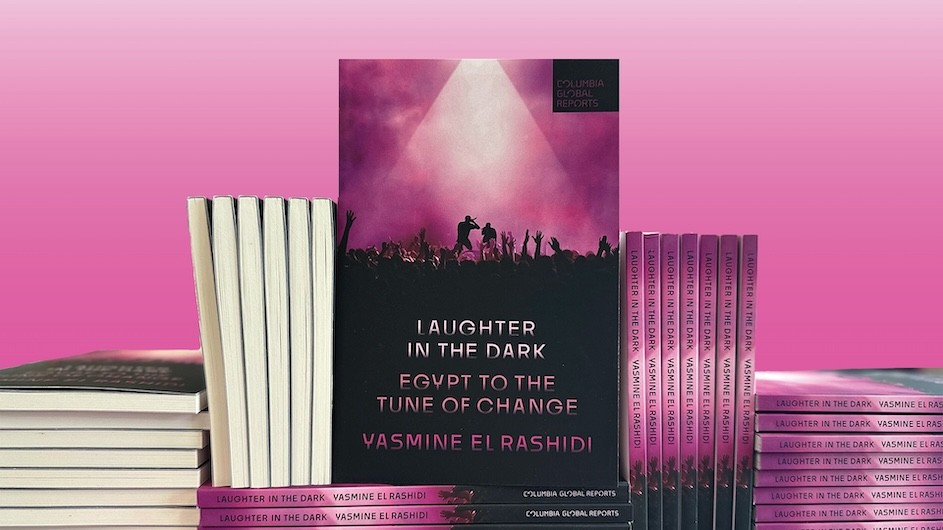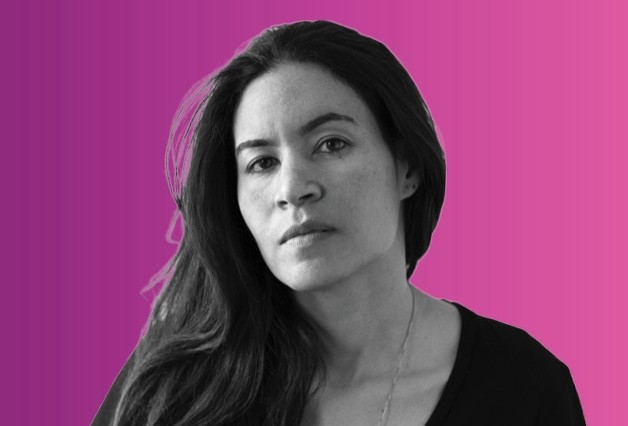What Can Hip-Hop Tell Us About Egypt Today?
In this book excerpt from Laughter in the Dark, Yasmine El Rashidi invites readers to explore a country that is being transformed, for good or bad, by the rise of a fresh youth culture.

As part of a developing series, Columbia News is introducing book excerpts. This first excerpt is from Columbia Global Reports, a nonprofit publishing imprint from Columbia University that commissions authors to produce works of original thinking and on-site reporting from all over the world, on a wide range of topics. This excerpt is from Laughter in the Dark: Egypt to the Tune of Change, by Yasmine El Rashidi, an author and journalist who is a 1999 graduate of Columbia School of Journalism.
Egypt is at its most oppressive point in its modern history. A polar opposite political point to the expectations of the freedoms that the people-led revolution of 2011 would bring. Under Hosni Mubarak, president of Egypt from 1981 to 2011, the political red lines had been clear—black and white, so to speak. Anything critical of the president, his sons, and a small circle of his advisors and confidants—which included businessmen as well as members of parliament and the state—was off limits. One could not address bilateral agreements with Israel, including major trade deals such as the Egypt-Israel gas-supply pipeline. Beyond that, everything was
fair game. Under the current president, Abdel Fattah El-Sisi, those lines morphed, expanding beyond political discourse to include anything from lurid lyrics in a song, to social media posts that are deemed “morally offensive.”
Today, at least six young women are in jail for being in videos said to be in violation of “family principles and values upheld by Egyptian society”—one clip involves a divorcée in tight-fitting clothes dancing with her boyfriend. Such arrests are not a matter of state policy per se, but the Stasi-like practice of “citizen patrolling,” of spying, monitoring, and reporting against fellow citizens. This policing system has discouraged anything potentially disruptive to the state, to include content posted by local social media influencers.

The content is perhaps less the offense than is the number of viewers who see it; under a law passed in 2018, social media users with more than 5,000 followers are considered “media outlets,” making them subject to prosecution for publishing anything considered “false news” or “incitement”—umbrella terms that can be twisted to include most all personal expression. In a state that has deemed itself perennially at threat, there are also no clear-cut criteria—the only constant is that parameters are continually shifting. Who is reported, prosecuted, arrested, released—all this is arbitrary.
Within this political climate, it is telling, then, that Egypt’s independent music scene, with its Arabic genre of hip-hop, known as mahraganat, has been thriving. In the tradition of Snoop Dogg, Tupac, Eminem, and Jay-Z, and borrowing from the history and technical forms of the genre, these Egyptian music artists are reliant on lyrics grounded in deeply personal, political, sexual, and socioeconomic realities—most everything the government would prefer citizens not to speak about, and the kind of material that citizen patrols love to report. The artists rap about their own lives, their neighborhoods, their rivals, their personal, economic, and political battles, as well as their successes, money, women, and dreams. In one song, for example, the duo Oka and Ortega rhapsodized about drinking alcohol and taking drugs—both considered blasphemy in Islam, and the drugs, needless to say, punishable with jail:
You’re sitting alone, idle-minded
Satan is leading you to the wrong path
He keeps telling you “let’s play, dude”
Let’s play, dude, why don’t you play, dude, let’s play, dude, let’s play, dude
You want to be a man of principle
quit the drugs
and say “I’m starting”
Satan comes and keeps telling you
Drink, dude, drink, dude, light it, dude
A growing league of local artists, mostly in their twenties, boasts millions of followers online. They have sold-out concerts at licensed venues, but also at street weddings and private parties, even as the state has repeatedly attempted to shut them down. Many of the most popular of these music artists were too young to properly partake in the Egyptian Revolution—most of them were pre-teens or in their early teens—but they came of age at that moment of rupture, when everyone was speaking out. It has, over time, come to define who they are, too—outspoken, uninhibited, independent, free.
Unlike my generation, which came of age in the nineties and was raised in constant fear of speech, the rules of the game for these music hipsters don’t abide by any social or cultural norms the country has known before. The long-held parameters of what can and can’t be said have become obsolete in their hands. They rap about long-taboo issues. They have no hesitations, and political fears seem not to exist for them.
These singers have commanded my attention, even envy at first, precisely for their lack of inhibition—for their fierce assertion of independent, nonconformist identities. They are free in an environment that does everything it can to break individual freedoms. They did not cave in, as my generational peers did. They do not swallow their words.
Egypt’s official population is pushing 105 million citizens. It is widely known that the number is larger—some analysts estimate by at least 5 to 7 percent. In August 2022, the government announced that the population had grown by 750,000 in the past six months. Sixty percent of that population, or 65 million people, are under the age of twenty-nine, so it is no surprise that these young musicians have millions of fans at their command. It is those fans, influenced by the music artists they revere, who are the future of the country—the ones who will essentially define what Egypt comes to be.
In as much as one can attempt to capture the energy and dynamics of a place as vast and diverse as Egypt, this book is a distillation of an ongoing moment in time, through the prism of a segment of these youth, and with a view to the future. The artists profiled are all illustrative, but they are also select—there are at least one hundred more that make up the scene. This book is not written for the insider, neither of the music scene nor of the country. Many of us who live here know this history and these stories, albeit through divergent political viewpoints and proximities. The book is therefore intended for the millions who had followed the Egyptian Revolution with intrigue, and have since turned their attention elsewhere. The story of Egypt, and of its revolutionary fervor, is not yet over.